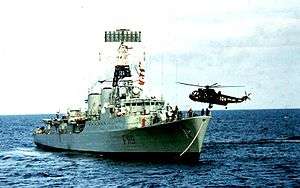HMS Eskimo (F119)
 | |
| History | |
|---|---|
| Name: | HMS Eskimo |
| Operator: | Royal Navy |
| Builder: | J. Samuel White |
| Laid down: | 22 October 1958 |
| Launched: | 20 March 1960 |
| Commissioned: | 21 February 1963 |
| Decommissioned: | August 1980 |
| Identification: | F 119 |
| Motto: |
|
| Fate: | Scrapped in 1992 |
| General characteristics | |
| Class and type: | Tribal-class frigate |
| Displacement: |
|
| Length: | |
| Beam: | 42 ft 3 in (12.88 m) |
| Draught: |
|
| Propulsion: |
|
| Speed: | 27 knots (50 km/h; 31 mph) (COSAG) |
| Range: | 4,500 nautical miles (8,300 km; 5,200 mi) at 12 knots (22 km/h; 14 mph) |
| Complement: | 253 |
| Sensors and processing systems: | |
| Armament: |
|
| Aircraft carried: | 1 × Westland Wasp helicopter |
HMS Eskimo was a Tribal-class frigate of the Royal Navy in service from 1963 to 1980. She was scrapped in 1992.
Eskimo was built by J. Samuel White, of Cowes,[2] at a cost of £4,670,000.[3] The frigate was launched on 20 March 1960 and commissioned on 21 February 1963 with the pennant number F119.[2]
Service
Eskimo began her third commission in October 1966. In 1967, Eskimo transferred to the Mediterranean Fleet, with which the ship took part in a number of port visits and exercises. In June, Eskimo replaced her sistership Ashanti off Aden in response to the start of the Six-Day War.[4] In 1968 she took part in Portsmouth 'Navy Days'.[5]
In 1976, Eskimo served as the West Indies Guardship. She escorted Queen Elizabeth II aboard Britannia as part of America's Bi-Centennial celebrations. Eskimo returned to the Caribbean in 1977.
Due to a manpower shortage in the Royal Navy,[6] Eskimo was reduced to the reserve in 1980, being placed into the Standby Squadron, and in 1981 was put on the disposal list.[7] In 1984 she was cannibalised for spare parts for three Tribal-class frigates sold to Indonesia. On 16 January 1986, Eskimo was towed from Portsmouth to Pembroke Dock to be used as a target, but was not used as such. In May 1992 she was towed from Pembroke to Bilbao, Spain to be scrapped.[8]
Commanding officers
| From | To | Captain |
|---|---|---|
| 1964 | 1966 | Commander E R Anson RN |
| 1966 | 1968 | Commander S A C Cassels RN |
| 1968 | 1968 | Commander J F Kidd RN |
| 1974 | 1975 | Commander A Grose RN |
| 1975 | 1976 | Commander R K Dibble RN |
| 1976 | 1978 | Commander C Morgan RN |
References
- ↑ Blackman 1971, p. 356.
- 1 2 Gardiner, Robert & Chesneau, Roger (1995). p. 518
- ↑ "News in Brief". The Times (55970): Col B, p. 6. 26 March 1964
- ↑ British warships redeployed in Mediterranean. The Times (56960): Col A, p. 10. 6 June 1967.
- ↑ Programme, Navy Days at Portsmouth August 31st-September 2nd 1968, p.19.
- ↑ Hansard (28 June 1979), hansard.millbanksystems.com. Retrieved 13 March 2012.
- ↑ Hansard (26 April 1982), hansard.millbanksystems.com. Retrieved 13 March 2012.
- ↑ http://www.shipstamps.co.uk/forum/viewtopic.php?f=2&t=8257 shipstamps.co.uk: HMS Eskimo
Publications
- Blackman, Raymond V.B. Jane's Fighting Ships 1971–72. London: Sampson Low, Marston & Co, 1971. ISBN 0 354 00096 9.
- Colledge, J. J.; Warlow, Ben (2006) [1969]. Ships of the Royal Navy: The Complete Record of all Fighting Ships of the Royal Navy (Rev. ed.). London: Chatham Publishing. ISBN 978-1-86176-281-8. OCLC 67375475.
- Gardiner, Robert & Chesneau, Roger (1995), Conway's All The World's Fighting Ships, 1947-1995, Conway Maritime Press, London, ISBN 978-0-8517-7605-7.
- Marriott, Leo, 1983. Royal Navy Frigates 1945-1983, Ian Allen Ltd. ISBN 07110 1322 5